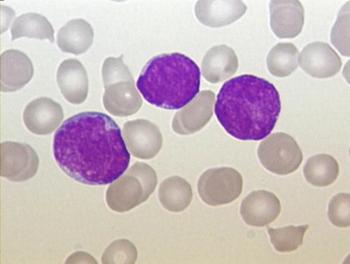
TKI De-escalation Safe in Most CML Patients With Major Molecular Response
A de-escalation of tyrosine-kinase inhibitor dose was safe in the majority of patients with chronic myeloid leukemia with stable major molecular response.
A de-escalation of tyrosine-kinase inhibitor (TKI) dose was safe in the majority of patients with chronic myeloid leukemia with stable major molecular response (MMR), according to the results of a study
According to the study, discontinuation of TKIs has been found to be feasible in patients with chronic myeloid leukemia with deep molecular response, but has not been studied in patients with MMR.
“In patients with chronic myeloid leukemia with stable MMR or better, a reduction in TKI treatment to half the standard dose appears safe, and is associated with improvement in TKI-related side effects,” wrote authors led by Richard E. Clark, MD, of the Institute of Translational Medicine and Cancer Research in the United Kingdom. “This finding implies that many patients with stable responses might be able to maintain their responses on lower TKI doses.”
The non-randomized, phase II trial enrolled 174 patients from 20 UK hospitals. All patients were in first chronic phase and had received TKI for 3 years or more. Patients were either in stable MR4 (n = 125) or in stable MMR but not MR4 (n = 49) for 12 months or longer. Patients were given half of their standard TKI dose (imatinib 200 mg daily, dasatinib 50 mg daily, or nilotinib 200 mg twice daily) for 12 months. The primary endpoint was the proportion of patients who lost MMR on de-escalation and regained MMR on TKI resumption.
During the study period, 7% of patients had loss of MMR. Molecular recurrence occurred less often in the MR4 cohort compared with the MMR cohort (2% vs 19%; hazard ratio, 0.12; 90% CI, 0.04–0.37; P = .0007).
“With a molecular recurrence rate of 2% after 12 months, de-escalation is clearly safe for patients in stable MR4 or deeper remission,” the researchers wrote. “Similarly, because 81% of patients in stable MMR, but not MR4, remained recurrence-free at 12 months, the offer of de-escalation to such patients is also clinically reasonable.”
Patients with MMR also had significantly shorter time to relapse compared with the MR4 cohort (median 4.4 months vs 8.7 months). The researchers found no association between time to recurrence and age, sex, weight, performance status, BCR-ABL1 transcript type, or duration of TKI therapy.
Within the first 3 months of de-escalation, patients described a decrease in individual side effects such as lethargy, diarrhea, rash, and nausea, but no further improvements were seen thereafter. The researchers noted that these improvements in adverse events were not enough to be detected by the quality-of-life assessment used in the study.
“Quality-of-life data with a symptom assessment tool more specific to patients with chronic myeloid leukemia treated with TKI would be of interest in future studies of TKI de-escalation or discontinuation,” they wrote.
Finally, the researchers found a savings in drug cost during the 12-month de-escalation period. Overall, 46.7% was saved from the expected TKI budget in the United Kingdom.
Newsletter
Stay up to date on recent advances in the multidisciplinary approach to cancer.
































































































